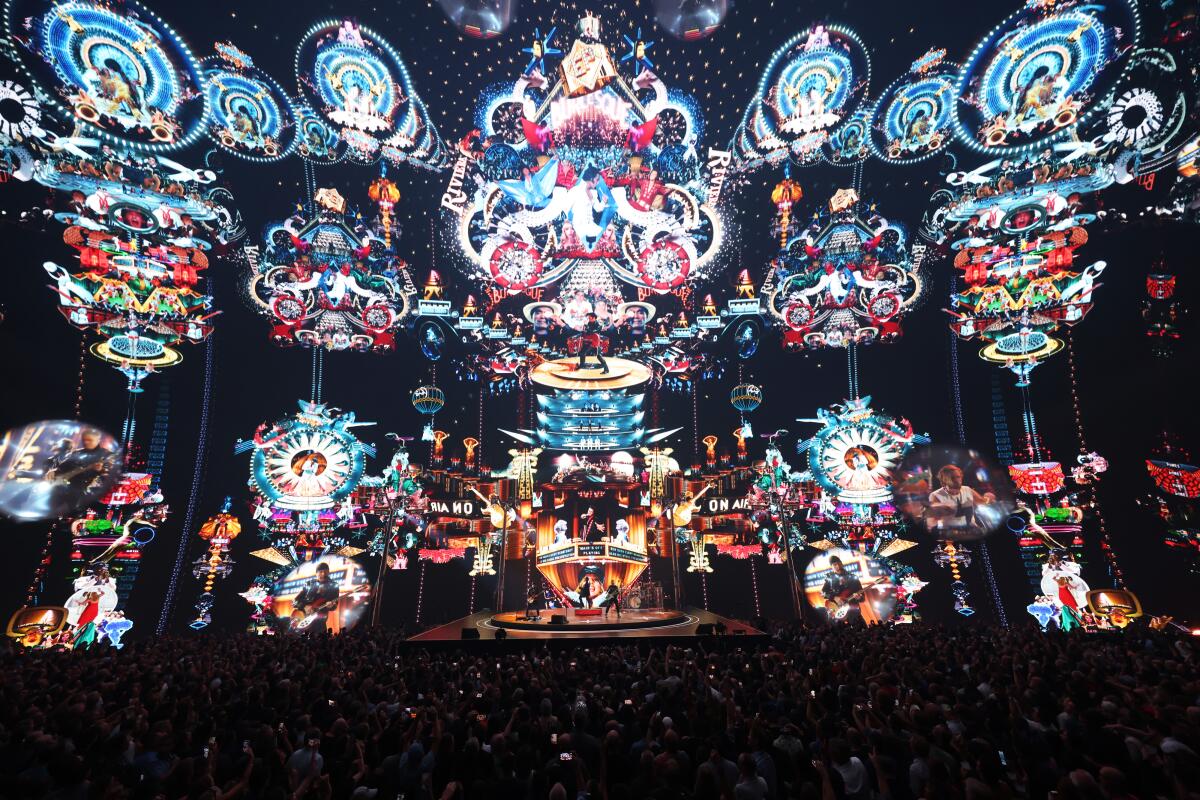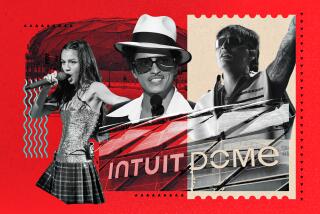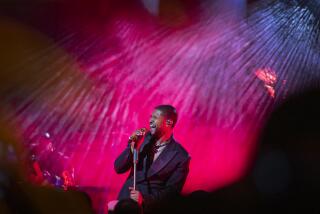U2 made a concert movie of its Sphere show. Sphere is the only place you can see it

Nine months after U2 wrapped its 40-date residency at Sphere, the veteran Irish rock band is back at the dome-shaped venue just off the Las Vegas Strip.
Well, sort of.
âV-U2â is a new concert movie that documents the groupâs high-tech âU2:UVâ show, in which singer Bono, guitarist the Edge, bassist Adam Clayton and drummer Bram van den Berg (filling in for Larry Mullen Jr.) revisited U2âs media-obsessed 1991 album âAchtung Babyâ as they inaugurated the $2-billion building outfitted with the worldâs highest-resolution LED screen. U2âs stay at Sphere was a critical and commercial success, blanketing social media with eye-popping video clips and raking in nearly $250 million, according to the trade journal Pollstar â and at a moment when the showâs stiff competition included Taylor Swiftâs Eras tour and BeyoncĂŠâs Renaissance tour.
So itâs no wonder that U2 followed Swift and BeyoncĂŠ in bringing its show to the screen. Unlike those pop superstarsâ films, though, this one you can see only at the place where the band filmed it â at Sphere, that is, where âV-U2â plays on that massive wraparound screen on nights when the Eagles arenât there for their residency. (Between U2 and the Eagles came gigs at Sphere by Phish and Dead & Company.) Directed by the Edge and his wife, Morleigh Steinberg, âV-U2â opened in September and was just extended through the end of February; tickets to see the movie are pricey, starting at around 100 bucks a pop.
Over the weekend, the long-running L.A. country-rock band opened a 20-date residency at the state-of-the-art venue just off the Las Vegas Strip.
Looking back at âU2:UV,â the Edge, 63, says a Sphere production is âits own distinct kind of art form â a new art form, I think, not just for music but for narrative film, for documentary, for all kinds of presentations. Itâs the ability to translocate the audience to a new place, be it real or imaginary.â (Among the vignettes in U2âs show were ones that put the crowd in a pre-Strip desert landscape and amid a menagerie of endangered wildlife species.) âYou canât divorce the scale of the imagery from what you might want to do with it,â the Edge adds. As inspirations, the guitarist cites Christo and Jean-Claudeâs 2021 wrapping of Parisâ Arc de Triomphe as well as Culver Cityâs Museum of Jurassic Technology, which he calls one of his favorite places in Los Angeles.
âAll those tiny miniatures that fit on the head of a needle â I think itâs so beautiful,â he says in a Zoom call from his place in Malibu. âAgain, itâs the scale that makes it unique.â
I get the desire to preserve an ambitious live show for posterity. And I get the impulse to sell tickets to folks who didnât pay to catch the show in person. What was the creative opportunity you saw in making this movie?
Youâve got to understand that there was a huge amount of risk associated with signing on to be the first band [to play Sphere]. Itâs all untried and untested technology, and the building â when we first went to see it, it was half-built, OK? So opening night arrives and we literally walk onstage, no idea if itâs going to work. Itâs kind of a white-knuckle ride. Coming out of the first few shows, we realized that not only is it working, itâs like all our ideas have landed. That was such a relief.
Then we pivot quite quickly to the thought of filming it, and what does that mean? We go through a process of consideration and elimination as we realize the show is so bespoke to this venue that to try and capture it for a small screen just wouldnât make any sense. So then we start thinking, Well, what about capturing it for the screen it happens to be on right now? What was here in potential was an immersive experience â maybe the first of its kind â where you can faithfully represent your live performance so that thereâs only a few giveaways that itâs not actually happening live in front of you. That was the thrilling proposition.

The goal was to get an audience member to buy the illusion that U2 is onstage.
Yes. The combination of visuals and the audio and the haptics of the seats â all of those things were brought to bear to try and basically turn on its head the whole idea of suspension of disbelief, so that youâre having to remind yourself that itâs not real, as opposed to pretending that it is.
Thereâs something very U2 about a concert film that you can see only in the place where the concert happened.
Iâd love if [media theorist] Marshall McLuhan could see it. What would he think? Since the beginning of touring âAchtung Baby,â we were riffing on this idea of âeven better than the real thing.â That wasnât lost on us. And I have to say: Finally getting to see U2 live was genuinely shocking. It gave me goosebumps. Weâre not half-bad.
The first few songs are shot from a steady position in the audience. Then the camera starts moving around.
You donât want to give that up too soon. You want people to enjoy the show as it was first designed and imagined. Then you give them a tab of acid and it goes in a completely different direction. We wait until âOne,â our fifth song [in the set] â that was a good moment to start deconstructing the show to some extent.
The musician and former Police frontman talks about his life and career ahead of a five-night stand at the Wiltern in Los Angeles.
A good moment in an emotional sense?
I think thatâs always the leading metric for us â the emotional connection. We had [director] Mark Pellington come in, and he was the one who suggested the close-up of Bono in âOne,â which was a great call. It breaks the movie out of the conceit of it actually being a live show, and suddenly you shatter the fourth wall.
That close-up of Bono is startling to behold.
I havenât actually had it measured, but it must be the size of a building.
Did Bono get to approve such a revealing shot of his own face?
Oh, yeah [laughs]. His word to us was: âIt canât be just spectacle â youâve got to capture the humanity of whatâs happening.â So, like, mistakes: Bono stumbled over some of his banter in the introductions, and he wanted to keep that in. This is not overly polished.

My instinct is to scoff at that idea. The whole point of Sphere is polish! But there actually is something kind of raw about the movie.
Part of that is practical. With modern post-production, itâs super simple to alter 35-mill format. But since this is such a massive amount of data, to really do anything too fancy would take months and an eye-watering amount of computer processing to achieve. Iâm sure future projects will be able to make that possible. But for us, it was kind of straightforward. We knew there wasnât an awful lot we could do beyond just make cuts and showcase the moments that we thought were the best representations of the show.
Does this movie pose a threat to live music in any way? You think about this or you think about ABBAâs hologram show in London â both enable bands to offer fans a concert-like experience without having to be there in person.
I donât see it as a threat â no more of a threat than any concert film. The ABBA thing, which Iâve seen, was really fun, given the fact that no oneâs seen ABBA perform in the flesh for generations. But I donât think any of this negates what exists in live concerts â itâs in addition to those offerings.
How did the Sphere experience shape U2âs live ambitions going forward?
I wouldnât rule out doing something for the Sphere in the future. But weâre itching to get back to regular concerts. Next thing we have to do is a new record, of course. This project was a celebration of âAchtung Baby,â so weâre anxious to do something thatâs about new work. Weâre already actively developing new material for what will become a U2 album in the future, and weâll be back to touring. As much as we loved being able to rely on the sound being great every night, thereâs a great momentum to being on the road. And seeing local fans, as opposed to relying on them coming to us â itâs different. We miss it.
More to Read
The biggest entertainment stories
Get our big stories about Hollywood, film, television, music, arts, culture and more right in your inbox as soon as they publish.
You may occasionally receive promotional content from the Los Angeles Times.













